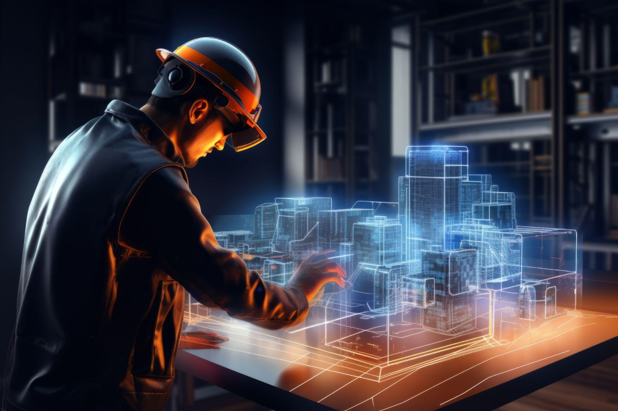The construction world is going through a major transformation thanks to technology, particularly Artificial Intelligence (AI). But what exactly does AI mean in this context? What are its advantages to construction, and should we be worried about it replacing human skills? This article is your guide to unraveling the impact of AI on construction, covering everything from its basic principles to practical uses, along with the hurdles and opportunities it presents.
Understanding Gen AI Consulting in Construction
In today’s digital era, industries are eager to leverage the capabilities of generative AI for their benefit. This has made it easier to streamline operations and boost efficiency, resulting in highly productive and cost-effective projects.
The potential of AI is especially promising in the construction sector, which has traditionally relied on manual labor and complex administrative processes. With machine learning and deep learning integration, various digital automation, calculation, and control systems are gradually transforming the construction landscape.
Benefits of Gen AI Consulting in Construction
The impact of generative AI consulting on construction has been revolutionary, introducing smart building technology with vast potential applications across all sectors. While there are numerous advantages, let’s focus on the most significant examples to avoid making this a lengthy read.
● Streamlined Planning and Scheduling
Generative AI services offer significant benefits in streamlining project schedules by giving numerous factors such as weather conditions, material availability, and workforce schedules. It can predict potential delays and recommend necessary adjustments, ensuring that projects stay on course.
This invaluable assistance in planning and scheduling leads to optimized resource allocation, cost reduction, and timely project completion. AI in Construction empowers construction managers to achieve smoother and more efficient project outcomes.
● Optimized Risk Management
Gen AI plays an essential role in improving the security on construction sites by utilizing data from sensors, security cameras, and other smart devices. Algorithms process this data to detect potential hazards before they arise, allowing site managers to take preventive action.
Project planning AI can also identify flaws in building materials and designs, mitigating the risk of expensive rework or structural failures. By harnessing these capabilities, AI enables construction companies to create safer and more efficient building environments.
● Enhanced Resource Management
Artificial intelligence revolutionizes construction by enabling smart building design with exceptional efficiency and precision. This technology optimizes the distribution of resources, including materials, labor, and energy.
By analyzing data, AI helps construction managers identify potential resource shortages and make real-time adjustments, ensuring the availability of necessary materials and personnel when required. AI streamlines the construction process, saving time and resources while enhancing project quality.
● Cost Reduction
Using AI technologies, construction firms can monitor and forecast building performance, automate routine tasks, and enhance resource management, including electricity and water usage. By pinpointing and rectifying inefficiencies, AI in construction facilitates cost savings and improves project efficiency.
As AI evolves, it is set to become an essential component of the construction sector, reshaping how we construct and maintain our surroundings. By streamlining processes and resource utilization, AI contributes to cost reduction and increased productivity, rendering projects financially sustainable.
● Quality Control
AI-driven visual inspection systems demonstrate remarkable accuracy in identifying and preventing potential issues. For instance, utilizing AI-enabled drones and cameras allows for real-time monitoring of construction sites to detect structural defects or material quality issues promptly.
In summary, AI in construction ensures that projects adhere to the highest quality standards, thereby enhancing customer satisfaction in the long run.
● Improved Efficiency
Smart building technology enables real-time monitoring of various systems, such as energy usage, lighting, and temperature control. AI in construction processes the gathered data to identify patterns and areas for improvement.
This allows building managers to optimize systems and prevent resource wastage. In summary, AI algorithms enhance overall operational efficiency, making projects more cost-effective.
Conclusion
AI is ready to revolutionize the construction industry, driving efficiency, cost reduction, and safety enhancements. The key lies in partnering with a trusted expert in the field.
From streamlining project timelines to bolstering safety measures, a generative AI services company is in charge of delivering innovative solutions for smart buildings. Their expertise spans ERP, analytics, inspection management, system integrations, project onboarding, and professional training.
Furthermore, you’d get the opportunity to get a tailored solution that seamlessly integrates essential functions into your construction business processes. This customized approach automates core HR, accounting, and project management processes, fostering smooth collaboration to optimize project efficiency and profitability.

